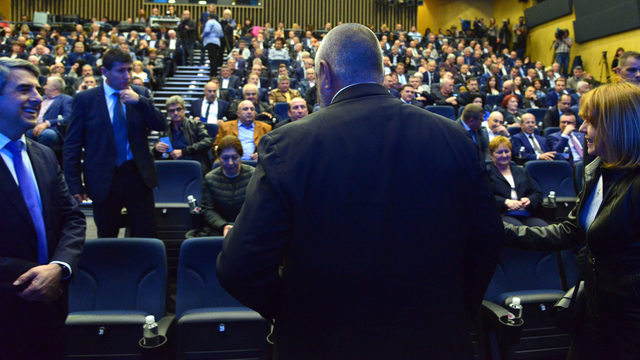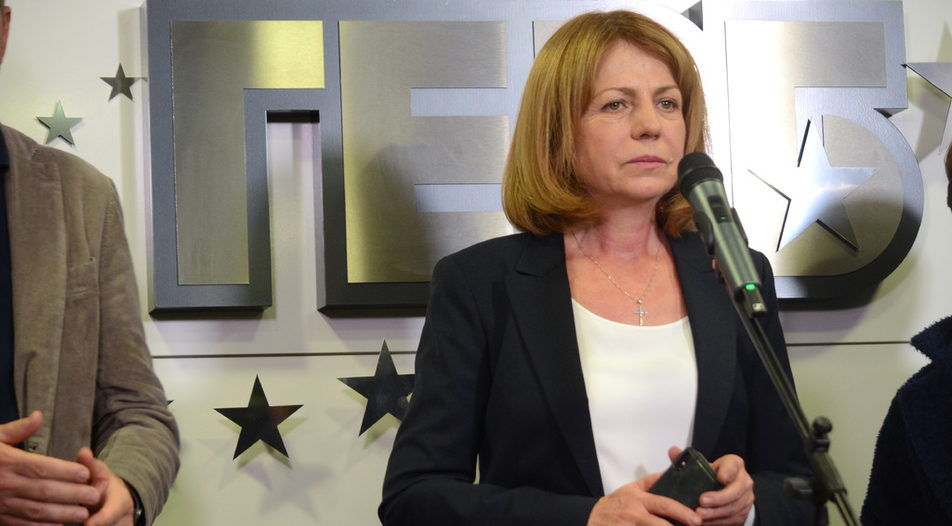| Accent |
|---|
| Such a result in Sofia shows that the voters are tired of GERB and are ready to even support a left-wing candidate, which was unthinkable a few years ago |
Several scandals have rocked Prime Minister Boyko Borissov and his ruling GERB party this year without necessarily leaving any scar on his Teflon image. Sure, the Apartmentgate scandal involving politicians who bought luxury real estate below market prices saw several leading party figures, including Mr Borissov's lieutenant and election-master Tsvetan Tsvetanov, ousted from the helm of the party but GERB didn't wither. The party jumped back on to its feet quickly and managed to hold its positions in the May elections for European Parliament.
GERB, which has been in power for most of the last ten years, however, received three major blows in recent months that shattered its perceived invulnerability.
First, it performed below expectations in the October-November local elections, losing some ground in comparison with the 2015 municipal vote. Though the outcome was not a heavy blow (GERB won in fifteen out of the twenty-eight big municipalities and lost in six cities it used to run), most victories were far from landslides, so undermining Mr Borissov's feeling of invincibility.
Second, an unexpected punch came from the selection of the next Prosecutor General - a vital ingredient of the Bulgarian power structure. To secure the election of Ivan Geshev, a close confidant of the current head of the Prosecutor's Office of Bulgaria, his supporters attempted to silence journalists and orchestrated a botched spy investigation to boost his credentials as a true pro-Westerner. It all caught Mr Borissov's off guard and revealed that the PM is not only losing control over Bulgaria's security apparatus and judiciary system but more and more often he is under control.
And lastly, Mr Borissov's hopes that Brussels would boost his reformist record received a dose of cold water. The European Commission declared that Bulgaria no longer needed monitoring of its judicial system (see more on p. 14) but reaffirmed that little has been done in the fight against corruption, while the overall judicial system is still under political influence.
Ceding political ground
Despite holding its positions in the municipal elections, GERB saw signs of wavering support. While in 2015 the party won twenty-two municipal centres, ten of which from straight first-round victories, this time the party won only fifteen regional cities, nine of which in the first round, and backed the winning independent candidates in two other cities. GERB lost support almost everywhere, both in terms of the number of constituencies and percentage of the vote.
Key cities where the party suffered because of internal struggles created by the departure of Mr Tsvetanov were Ruse, Blagoevgrad and Sofia. In the first two, GERB lost by a significant margin and won Plovdiv, the second largest Bulgarian city, only after a heated contest. It lost control of three smaller cities - Pleven, Pazardzhik and Yambol, to independent candidates and four regional centres - Pernik, Blagoevgrad, Razgrad, and Ruse, the fifth-largest city, to the main opposition force, the Bulgarian Socialist Party (BSP).
The most important and visible loss of support, however, occurred in the heartland of the party - Sofia, where incumbent mayor Yordanka Fandakova won in a run-off vote against former ombudsman and ex-BSP spearhead Maya Manolova. Despite Ms Fandakova's victory with 50 per cent of the vote, compared to Ms Manolova's 45.1 per cent, uncertainty about her reelection reigned until the last possible moment.
This was the first time in her 10-year-long term of office and four elections that she ever had to face an opponent in a run-off. It was also the first time GERB faced serious opposition in the capital city where the party had established its dominance ever since its leader, Mr Borissov, served as mayor twelve years ago. And Ms Manolova's result was not the only blow the party suffered - GERB won only half of Sofia's 24 district mayoral seats, while Democratic Bulgaria, a small liberal coalition, grabbed eight seats, BSP - one and three seats went to independent candidates. In addition, the party would have lost its overall majority in the Municipal Council were it not for an unexpected mathematical rearrangement of seats due to the high result of independent candidate for mayor Boris Bonev who did not run on a party ticket.
Such a result in Sofia shows that the voters are tired of GERB and are ready to support even a left-wing candidate, which was unthinkable a few years ago.
The change in the political climate in Sofia has had an immediate impact. The entry in the local parliament of a significant number of Democratic Bulgaria city councillors came with a campaign to increase transparency in the management of the heavily indebted and unreformed Sofia heating utility company. The centrist opposition party will likely become the much-needed watchdog in the Municipal Council until recently dominated by GERB.
To Mr Borissov, it appeared that losing control of a few towns and cities was to be expected.
"I think we are now reverting to a normal electoral process because it is not normal for one party to win all the regional cities," he told a GERB press conference after the second round of voting. "For all of our mistakes we got a spanking, and for all of our good deeds, congratulations," he said, adding that his party plans to set an upper limit of three terms of office for its mayors.

Borissov losing control
The debacle surrounding the procedure for the selection of the next Prosecutor General was one of the those rare moments when political tensions and scandals are so powerful that they act as X-rays - the thick cover of propaganda and public hypocrisy wears thin, revealing the ugly interests that manipulate the political play.
Although the status quo in Bulgaria's judicial system had long established Ivan Geshev, currently deputy to top prosecutor Sotir Tsatsarov, as the sole candidate for the post, the series of NGO and civic protests against his nomination drew attention to problems with his selection. It simultaneously highlighted that interests different from those of Mr Borissov stand behind Mr Geshev's nomination and more importantly - that there is little the prime minister can do about it.
Even as good actor an actor as Mr Borissov looked truly surprised when Sylvia Velikova, a critical judicial system reporter with public radio BNR, was taken off the air. This was a blatant attempt to silence dissenting voices, something the prime minister prefers to do quietly. There is no doubt that only Mr Geshev and his supporters had an interest in Ms Velikova's removal and Mr Borissov never misses an opportunity to state the obvious. But after Ms Velikova was reinstated, he preferred to swallow the scandal and - unusually for him - not to shift the blame.
Later, he had to endure the embarrassment of explaining to Moscow's ambassador in Sofia that charges of spying for two Russian organizations brought against a Bulgarian politician were not an anti-Russian move. The investigation against Nickolay Marinov, leader of the Russophile Movement who has never hidden his pro-Russian sentiment, came all of a sudden, although the charges are based on facts publicly known for several years now. The timing suggests that the prosecution had decided to put pressure on President Rumen Radev who has ties to Mr Marinov and has always been blamed for taking pro-Russian stances. The president could hamper the election of the next Prosecutor General and having a trump card against him fits Mr Geshev's game plan.
The indictment against Mr Malinov came at a very tense moment for Mr Borissov. He had been trying to restart a Russian gas project in Bulgaria for several years and drumming up spy scandals wouldn't help in doing that. But Mr Borissov swallowed it again.
Stamp, but not of approval
Lastly, the short-lived hope of Prime Minister Borissov that the European Commission's announcement in October that Bulgaria has fulfilled the criteria on the rule of law laid down in the Cooperation and Verification Mechanism (CVM) would be a stamp of approval for his reformist track record did not materialize. The monitoring under CVM was introduced in 2007 to spur reforms in Bulgaria's inefficient judiciary and energize the government to fight corruption in earnest and its end was eagerly awaited in Sofia.
The EU's executive was very cautious not to praise the Bulgarian efforts to fight graft and used its decision to press the government to accept new reforms of the judicial system. The European Commission indicated that until Sofia has fulfilled the recommendations of the Venice Commission, an advisory body of the Council of Europe in the field of constitutional law, to introduce real accountability of the Prosecutor General, the CVM will not be lifted for good.
Taken separately, neither of these issues is something that can topple GERB or Mr Borissov overnight. Yet, this series of developments on all fronts is testing the limits of the prime minister's ability to use tactical manoeuvring to win strategic gains. He and his party are gradually losing popularity, as anyone who has been at the helm of the country for the better part of a decade would, but they are also losing control of key sectors like the prosecution which has served them almost seamlessly for this entire time. This might amount to a storm in the making in the longer term.
| Accent |
|---|
| Such a result in Sofia shows that the voters are tired of GERB and are ready to even support a left-wing candidate, which was unthinkable a few years ago |
Several scandals have rocked Prime Minister Boyko Borissov and his ruling GERB party this year without necessarily leaving any scar on his Teflon image. Sure, the Apartmentgate scandal involving politicians who bought luxury real estate below market prices saw several leading party figures, including Mr Borissov's lieutenant and election-master Tsvetan Tsvetanov, ousted from the helm of the party but GERB didn't wither. The party jumped back on to its feet quickly and managed to hold its positions in the May elections for European Parliament.












